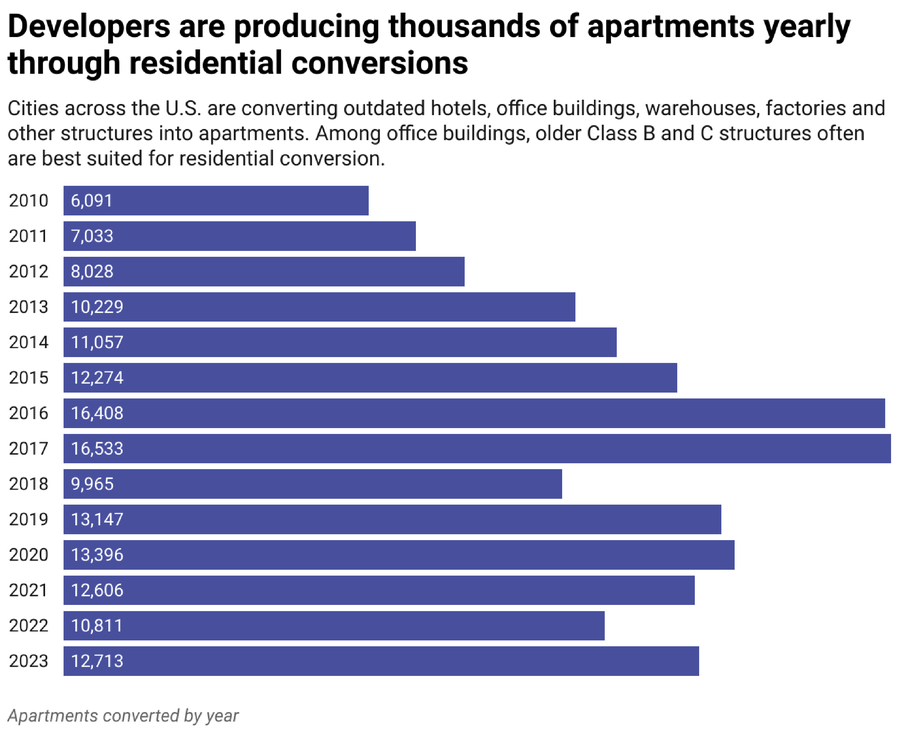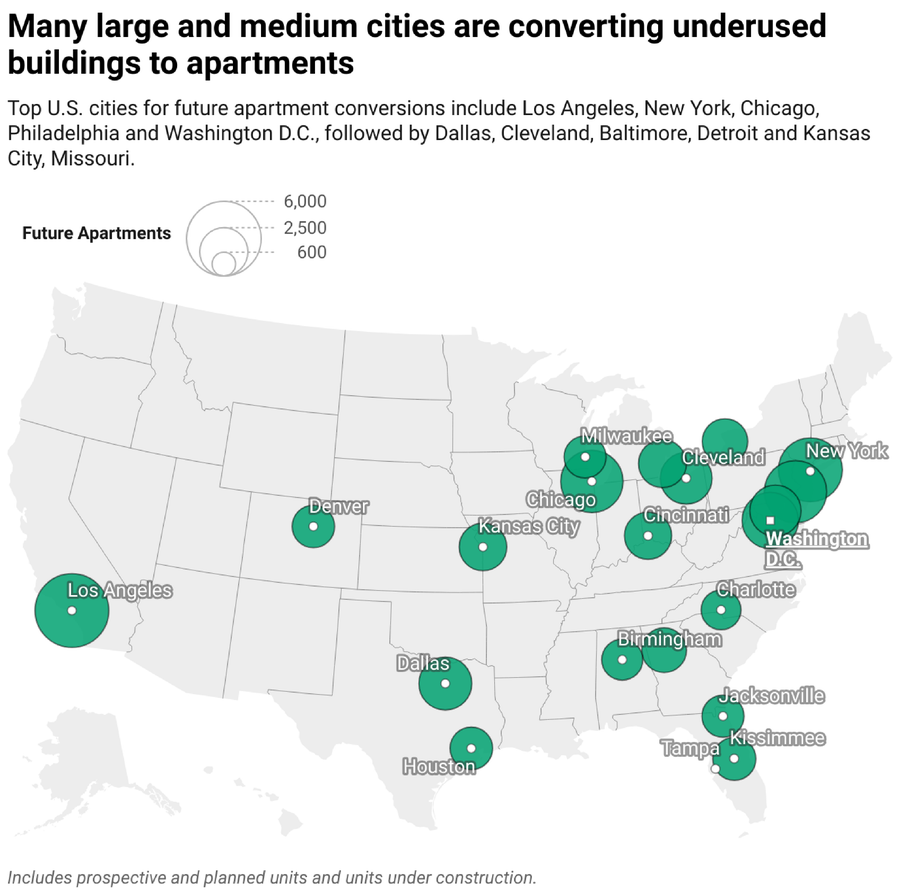The following essay is reprinted with permission from ![]() The Conversation, an online publication covering the latest research.
The Conversation, an online publication covering the latest research.
It took a global pandemic to convince American businesses that their employees could work productively from home, or a favorite coffee shop. Post-COVID-19, employers are struggling to find the right balance of in-office and remote work. However, hybrid work is likely here to stay, at least for a segment of workers.
This shift isn’t just changing lifestyles – it’s also affecting commercial spaces. Office vacancy rates post-COVID-19 shot up almost overnight, and they remain near 20% nationwide, the highest rate since 1979 as tenants downsize in place or relocate. This workspace surplus is putting pressure on existing development loans and leading to defaults or creative refinancing in a market already plagued by higher interest rates.
On supporting science journalism
If you’re enjoying this article, consider supporting our award-winning journalism by subscribing. By purchasing a subscription you are helping to ensure the future of impactful stories about the discoveries and ideas shaping our world today.
Office tenants with deeper pockets have gravitated to newer and larger buildings with more amenities, often referred to as Class A or “trophy” buildings. Older Class B and C buildings, which often have fewer amenities or less-desirable locations, have struggled to fill space.
High vacancy rates are forcing developers to get creative. With reduced demand for older buildings, along with housing shortages in many American cities, some downtown buildings are being converted to residential use.
These projects often include some percentage of affordable housing, underwritten by tax incentives. In October 2023, the Biden administration released a list of federal loan, grant, tax credit and technical assistance programs that can support commercial-to-residential conversions.
As an architect, I’m encouraged to see these renovations of older commercial buildings, which are more economical and sustainable than new construction. In my view, they are fundamentally changing the character of our cities for the better. Even though only about 20% to 30% of older buildings can be profitably converted, architects and developers are quickly learning how to grade these structures to identify good candidates.

The Conversation (CC BY-ND); Source: RentCafe
From workplace to living space
Converting commercial buildings to apartments didn’t start with the pandemic. In the decade leading up to the outbreak of COVID-19, developers converted more than 110,000 apartments from outdated hotels, office buildings, factories, warehouses and other buildings across the U.S. According to industry data, more than 58,000 apartments are currently being converted from office buildings.
Several characteristics of older Class B and C buildings make conversion particularly attractive. These buildings typically have smaller floor plates – total square footage of space per floor. Importantly, they also have shorter “core-to-shell” distances – the distance from the building core that contains stairs and elevators to the window wall.
Residential building codes generally require that natural light reach most rooms. Since living spaces, bedrooms and bathrooms are often separated by walls, a smaller core-to-shell distance allows more rooms to access natural light, making the conversion easier.
In contrast, typical new office buildings have larger floor plates and core-to-shell distances that sometimes can exceed 50 feet. This makes them more difficult to convert to residences.
But it’s not impossible. One creative solution involves moving the window wall inward by several feet to create outdoor decks. That’s an appealing amenity, but also an extra cost. In some conversions where the core-to-shell depth is greater than needed, developers have added interior vertical shafts or window wells to bring daylight to interior spaces.
Many older commercial buildings also offer higher ceilings, which are especially desirable in the residential market. Apartments and condos typically don’t need to conceal mechanical and electrical services with suspended acoustic tile ceilings, as offices do, so they can provide 12 feet or more of clear ceiling height.
Some older buildings, including many made of brick or stone, have large windows, which also are desirable in residential use. Conversely, smaller windows or higher sill heights may be disincentives to conversion.
Many older buildings were constructed before air conditioning was widely available, so they have operable windows. This is yet another plus for residential conversion, since occupants typically desire natural ventilation in their dwelling unit.
Obstacles to conversion
Some characteristics of older buildings can make residential conversion more difficult. For example, location always matters. Buildings that are far from other amenities, such as restaurants or grocery stores, may be less desirable.
Buildings with more unusual floor plates or geometric forms that work for office use may be difficult to carve up into residential units. Older structures that contain asbestos or lead paint can require expensive remediation.
Zoning laws may bar residential use or otherwise limit what can be done with a building. Cities can play an important role in encouraging residential conversions by revisiting zoning codes or offering tax incentives to developers.
One of the biggest costs of a residential conversion is the need to replace building systems such as plumbing and heating. Plumbing requirements in commercial office spaces, for example, are largely met with restroom facilities in the building core. Apartments or condos each require their own bathroom and kitchen, adding significant cost.

The Conversation (CC BY-ND); Source: RentCafe
A return to ‘walkable cities’
Despite these challenges, if residential conversions bring people and energy back to downtowns outside of the workday, stores, restaurants, entertainment and other amenities of a vibrant lifestyle will follow.
Architects, planners, developers and politicians are increasingly interested in “walkable cities” or “20-minute cities.” Both of these concepts allude to providing necessary amenities like grocery stores, schools and restaurants that are accessible to residents on foot, reducing the need to own a car and promoting a more sustainable lifestyle.
Walkable cities aren’t a new idea. Throughout the 19th century, people in U.S. cities like New York and Chicago lived, worked, shopped and socialized within mixed-use neighborhoods.
The growth of car ownership post-World War II separated these uses into residential suburbs, office parks, shopping malls and cineplexes. Many critics view suburbanization as a failed experiment that has promoted sprawling development, reliance on cars and economic inequality
As more downtown office buildings are converted to residential use, many of them are likely to house restaurants, day care facilities, grocery stores and other service businesses, typically on their ground floors. These amenities contribute to the financial success of a project and to the vibrant lifestyles of its residents.
All of these shifts prompt questions. Can architects and developers find ways to design buildings that serve multiple uses over several centuries, rather than a single targeted use that becomes obsolete in 100 years? Can mid- and high-rise buildings be envisioned as flexible structural grids, with lower-cost and easily changeable modular inserts? Such structures could accommodate ever-changing needs, some of which we may not yet know will be critical to the urban infrastructure.
Architects, planners and developers are beginning to explore these questions. Converting downtown offices to residential use could be just the starting point. And it’s a reminder that dynamic cities can reinvent themselves in response to challenges.
This article was originally published on The Conversation. Read the original article.
